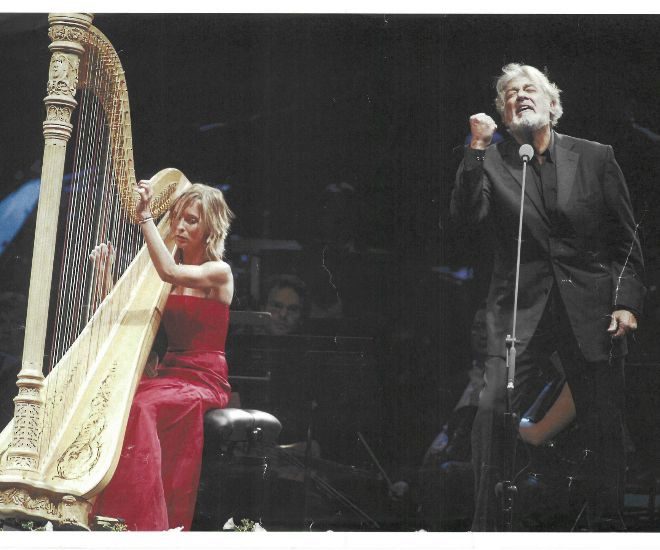They have shared scenarios for two decades. Out in defense of the singer for sexual harassment
Placido Domingo: the blackmail of Scientology that threatened the fortune of the tenor
They have a recurring joke: He calls her "cousin" and she sometimes tells him "uncle." Luisa Domingo (42) and Plácido Domingo (78) not only share a surname that gives rise to complicities. They have also worked together for two decades, she as a harpist and he as the tenor - later converted into a baritone - the world's most important. The recent accusations of sexual harassment against the Spanish singer in the United States have caused a cataclysm in the world of lyricism: while in Europe there have been signs of support for him, both by institutions and by prestigious voices with which he has Shared scenario, on the other side of the Atlantic things have developed very differently. First came the suspensions of their recitals in Philadelphia and San Francisco. Then came his abandonment, hours before the premiere, of the Macbeth production he was preparing at the Metropolitan Opera in New York (MET), due to the protests of theater workers. And, finally, his resignation as general director of the Los Angeles Opera in full external research on his behavior in the institution.
"Everything that is happening is so bad for me. I can only speak well of him, " says Luisa Domingo after a rehearsal with the Valencia Orchestra. "It seems to me a gentleman," he says, reaffirming one of the definitions that have been repeated in recent months, at least in Spain. "With me he never exceeded or hinted at anything."
"I have always been a very affectionate person. But affectionate as if I were with my friend Torres in the orchestra or with my cousin," says the instrumentalist. "And, in no case, excessively affectionate or slimy . Nothing you could think was weird or unusual. Always a very delicate being in everything."
And he starts to remember the nights that have accompanied him with his harp in concerts. "The best experience of my life," he summarizes. Like that recital at the Gerry Weber Stadion in Halle (Germany) "before 16,000 people, something I had never seen in the world of classical." Also in Benidorm or in Valencia itself, in whose Palau de Les Arts Plácido "has overturned, as with Valencia itself", as its namesake assures.
"If I tell you the truth, I am not known as much for the contests I have won as for playing with Placido," says the interpreter. But he does not say it with an affront, but as a pride.
Because, sometimes, it seemed that the surname was real and Luisa felt Placido as a member of her family. "Sometimes, if they could, my parents came to see me when I played with him, because they are very music lovers. And I really liked that detail I had to invite them to dinner," he says. "Like his wife, Marta, also super affectionate. I remember that one day we had to have dinner later, like other times, and my parents couldn't come for anything. Well, he and she were very interested in them. I don't know , he has these very human things. And, I repeat, always very kind, Marta and Placido. "
Hence, he wants to be present at the Palau on November 2 , at the premiere of the assembly of Nabucco which is his first performance in Spain since the accusations against him began. " I will go to support him . But in the same way that whenever I came to Valencia I was going to see him," he explains. Although this time is different. "I think it's important that I notice people's support."
Although for a long time Luisa Domingo had to carry the bullet of being the "only girl" in the various formations she was in, she does not consider sexism to be a theme within the universe of classical music. "I think the situation is very balanced. It is true that in some formations there were no women until the turn of the century, until two days ago, as who says. But more and more women are seen in the orchestras . In fact, absolutely no one he cares if the violinist who enters an orchestra is male or female, "he says. "But of course it has changed a lot: I remember touring with the instrumental group, here in Valencia, and I was the only woman. It drew attention, yes."
In any case, he does not feel that the world in which he operates is that nightmare of harassment and discrimination that has been portrayed as a result of cases such as Placido. "I remember a Traviata we did in Valencia with Vittorio Grigolo," Domingo digs through his memory. Precisely, the Italian tenor had just been expelled by the Royal Opera House after an incident in which he allegedly groped a choir component during the final greetings of a performance. "When I finished, I had this little time in which I was outside next to him, waiting. Everything had gone very well, he was very happy and gave me a spike, a little kiss on the lips. That was nothing, he gave me to laugh with my mother and my friends, "he recalls amused. "Well, Placido was not even a joker with these issues. He is an extremely careful person," he emphasizes, with the wish that those who doubt him end up knowing the face he has always shown before her.
According to the criteria of
Know more
Comments
This news has no comments yet
Be the first in give your opinion
0 comments
